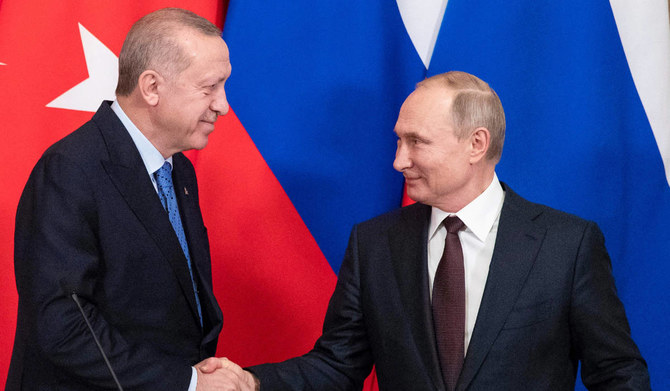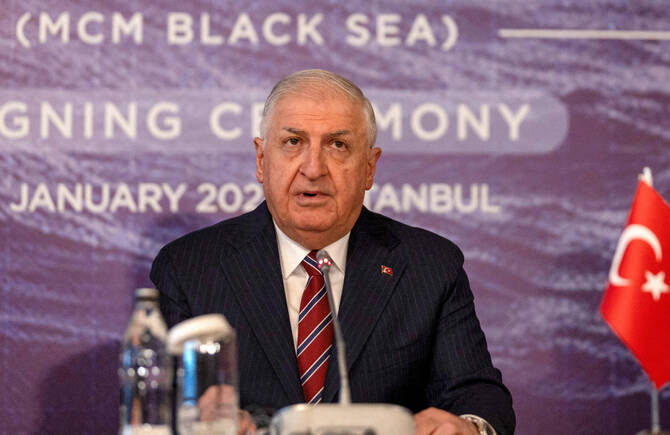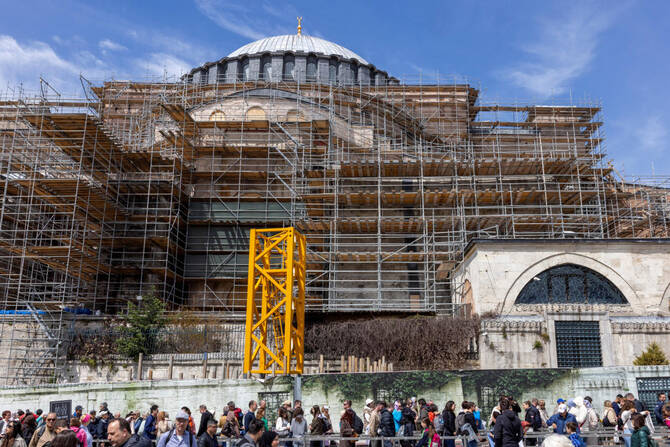According to Ozgur Unluhisarcikli, Ankara office director of the German Marshall Fund of the US, Erdogan’s main priority would be to ensure the continued flow of much-needed cash from Russia and Gulf countries, while avoiding friction with Europe and the US so that he can attract investments from the West.
“While Turkiye’s relations with neither Europe nor the US can be expected to be put back on track, they can at least be stabilized as both Erdogan and his Western counterparts would benefit from this,” he told Arab News recently.
“The congratulatory messages from Europe and the United States suggest that this is also the tendency in the West.”
President Joe Biden congratulated Erdogan on his reelection, and tweeted: “I look forward to continuing to work together as NATO Allies on bilateral issues and shared global challenges.”
For Unluhisarcikli, Erdogan will also need to make tough decisions early on in his third term as president.
“The US, which has shown restraint so far due to the elections in Turkiye will press its points on Russia sanctions and NATO enlargement more strongly in the period ahead. Erdogan’s decisions on these issues and developments in the US about Turkiye’s request to purchase new F-16s could pivot the Turkiye-US relationship in any direction,” he said.
The administration of Donald Trump removed Turkiye from the F-35 fifth-generation jet program in 2019 over its acquisition of the Russian S-400 missile system.
Experts also underline that with Erdogan winning, Turkiye will continue its recent efforts to repatriate hundreds of thousands of Syrian refugees to zones under Turkish control in compliance with international law.
Although being met with suspicion by Washington, the normalization efforts with Syria’s President Bashar Assad are also expected to continue as Erdogan, and his new ultranationalist and anti-immigrant allies in the parliament, consider the restored ties with Syria as the only solution to send back Syrian refugees in Turkiye to their homeland.
Erdogan’s new ally, Sinan Ogan, who ran as the third presidential candidate in the first elections, then endorsed Erdogan’s candidacy in the runoff, said during his campaign that he would consider repatriating refugees by force if necessary.
Karol Wasilewski, an analyst for 4CF The Futures Literacy Company and a founder of Krakow-based Institute for Turkiye Studies, expects continuity in Turkish diplomacy and decision-making in the short run, on the economy and foreign policy.
“Erdogan would, most likely, continue his ambiguous foreign policy in which Turkiye, on the one hand, gives its Western allies arguments that it still can be considered an ally — that’s why I won’t be surprised if Erdogan finally agrees on Sweden’s membership — while, on the other, decisively pushes for its interests, even when it harms NATO internal cohesion,” he told Arab News.
Following the support he received in Sunday’s elections, and having regained flexibility for his political and diplomatic maneuvers, Erdogan is also expected to make some U-turns without risking any major backlash from his constituency.
While Sweden’s accession bid has yet to be approved by Ankara, Stockholm’s membership — which has long been rejected by Erdogan, who accused the country of harboring terrorists — may also be used as a trump card for securing a commitment from the US for F-16 fighter jets ahead of NATO’s next summit this July when Erdogan and Biden are expected to meet.
The admission of Sweden by Turkiye would help the US administration in pushing for F-16 sales through Congress.
But Erdogan’s uneasiness with the US support for Syrian Kurdish militia — People’s Protection Units or YPG — is unlikely to change under his third term as his government considers the YPG as an extension of the outlawed Kurdistan Workers Party in Turkiye.
On Friday, Interior Minister Suleyman Soylu said that after the elections, “whoever pursues a pro-American policy in Turkiye will be labeled a traitor,” hinting at a possible transactional relationship with Washington in the post-elections period.
For Wasilewski, Erdogan’s win may serve as another chance for Euro-Asianist segments in Turkiye to strengthen themselves in the security apparatus.
“In (a) five-year perspective, this may be something that would cast (an) even bigger shadow over Turkiye’s relationship with the West,” he said.
Another dimension of the post-election process would be the Western allies’ position toward Turkiye now that the election dust has settled.
“I wouldn’t be surprised if the US decided to increase pressure on Turkiye on areas that seems vital to their interests, such as sanctions on Russia,” he said.
“The way that Erdogan responds to this possible pressure will be one (other) factor determining Turkiye’s relations with the West,” he added.
In terms of Turkish-Russian relations, Ankara is expected to continue its current political and economic relations with the Kremlin as well as deepen its cooperation in the energy field, with the help of the personal rapport between the two leaders.
Close ties with Russia as well as the Gulf will also help Erdogan in achieving his goal of rendering the Turkish economy more independent from Western markets. Ankara has not joined Western sanctions against Russia, but continues to provide military support to Kyiv.
Turkiye’s $20 billion first nuclear power plant, that will be owned for the first 25 years by the manufacturer, Russian energy company Rosatom, was recently inaugurated in a virtual ceremony. And being the largest nuclear construction project in the world, Russian leader Vladimir Putin said the plant deepened Turkish-Russian ties.
Russia also delayed a portion of Turkiye’s natural gas payments in early May ahead of the general elections.
Attracting high numbers of tourists from Russia are also required to help the Turkish economy keep afloat during summertime, while Erdogan will also remain in campaign mode before Turkiye’s next polls, the municipal elections scheduled for March next year.
“Putin is well aware that close ties between Russia and Turkiye are vital to his interests, especially after Russian aggression on Ukraine, and will continue to put a great effort to preserve them in a good shape,” said Wasilewski.
“Feeding Turkiye’s dreams of being the gas hub serves Erdogan’s narrative of Turkiye as a great power,” said Wasilewski.






















